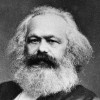“ A thing can be a use value, without having value. This is the case whenever its utility to man is not due to labour. ”
Karl Marx, Das Kapital (1867). copy citation
| Author | Karl Marx |
|---|---|
| Source | Das Kapital |
| Topic | utility value |
| Date | 1867 |
| Language | English |
| Reference | |
| Note | Translated by Samuel Moore and Edward Aveling |
| Weblink | https://www.marxists.org/archive/marx/works/download/pdf/Capital-Volume-... |
Context
“and vice versâ, the less the productiveness of labour, the greater is the labour time required for the production of an article, and the greater is its value. The value of a commodity, therefore, varies directly as the quantity, and inversely as the productiveness, of the labour incorporated in it. *
A thing can be a use value, without having value. This is the case whenever its utility to man is not due to labour. Such are air, virgin soil, natural meadows, &c. A thing can be useful, and the product of human labour, without being a commodity. Whoever directly satisfies his wants with the produce of his own labour, creates, indeed, use values, but not commodities.”
source


